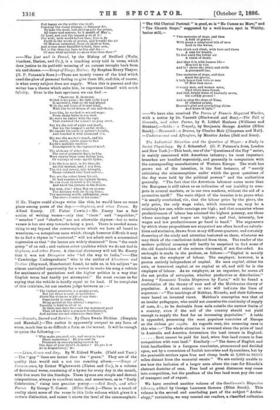The Industrial Situation and the Question of Wages : a
Study in Social Physiology. By J. Schoenhof. (G. P. Putnam's Sons, London and New York.)—This book, one of the " Questions of the Day" series, is mainly concerned with American industry ; its most important branches are handled separately, and generally in comparison with the corresponding manufactures of Western Europe. The work has grown out of the intention, in the first instance, of " merely criticising the misconceptions under which the great questions of the day were held by the political powers" and the authorities generally. "The fact that the American labourer earns more than the European is still taken as an indication of our inability to com- pete in neutral markets, or in our own markets, without the aid of a protective tariff." The main object of the treatise is to prove what "is usually overlooked, via , that the labour price by the piece, the only price, the only wage value, which concerns us, may be a relatively low one, while earnings are high ; and that countries whose productiveness of labour has attained the highest potency, are those whose earnings and wagea are highest; and that, inversely, low wages and low productiveness go hand in hand." The arguments by which these propositions are supported are often based on calcula- tions and statistics, drawn from m any different quarters, and certainly deserving of the study and attention bestowed on them, whatever we may think of the conclusions deduced from them. The reader of the modern political economy will hardly be surprised to find some of the old foundations of the science discussed, if not discarded. An onslaught is made in the preface, as follows:—" Capital is usually taken as the employer of labour. The employer, however, is a person entirely independent of capital. He uses capital, either his own, or borrowed capital, or no capital at all, and still he is the employer of labour. As an employer, as an organiser, he earns all the net profits of enterprise, whether productive or distributive." Among " Economic Truths Disproven by Facts," will be found a confutation of the theory of rent and of the Malthasian theory of population. A short extrac; or two will indicate the lines of argument :—" The teachings of Malthus, Ricardo, and their followers were based on inverted views. Malthus's conception was that of an insular pedagogue, who could not conceive the continuity of supply of corn, &3., to be derivable from soils outside the narrow limits of a country, even if the soil of the country should not yield enough to supply the food for an increasing population." A table is appended, presenting the most populous countries of Europa as the richest per capita. As regards rent, the reasoning runs in this wise:—"The whole situation is reversed since the price of land in Australia and America determines the land tenure in England.
Rent cannot be paid for land, when free laud comes in free competition with rent land." Similarly :—" The doom of English and Irish landlordism is a foregone conclusion, pronounced and decided upon, not by a committee of foolish terrorists and dynamitera, bat by the peaceable settlers upon free and cheap lands at 5,000 to 10,000 miles distant from the manorial estate." We are entirely unable to see how the inclusion of a larger area alters the case for Ricardo's abstract doctrine of rent. Free land at great distances may come into competition, but the produce of the free land must pay the coat of transport and of export.


































 Previous page
Previous page